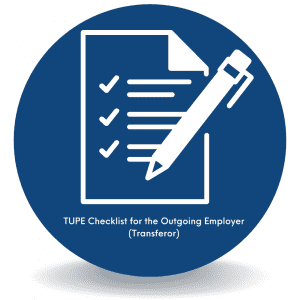This guide is to be used by the employer who is transferring their business or a service they currently operate, known as the outgoing employer or transferor.
Not all stages of this checklist will be appropriate to each transfer and it is always advisable that professional legal advice is sought at an early stage in the process.
1. Does TUPE apply to the transfer?
TUPE applies to a “relevant transfer”, which means either or both of the following:
- A transfer of a business, or part of a business where there is a transfer of an economic entity that retains its identity (a business transfer).
- A client engaging a contractor to do work on its behalf, reassigning the contract or bringing the work “in-house” (a service provision change).
In the majority of cases, TUPE will not apply to the transfer of shares.
2. Which employees form part of the ‘organised grouping’ and will transfer with the business or service?
Deciding who should transfer may be a simple process when the whole of a company or department is transferring. Deciding who transfers may be trickier when there is a service provision change and you have staff who may work on different projects and services. You will need to evaluate each employee’s role and duties to see whether they fall into the organised grouping.
3. Establish clear lines of communication between yourself and the employees
-
- Is there a recognised trade union or elected representative who will need to be informed of the possibility of a transfer?
- If there is no recognised union and there are over 10 employees, arrange an election to appoint employee representatives.
- If there are less than 10 employees then employees can be consulted with directly.
How you communicate with your employees is not only important from a legal perspective but also for staff moral and retention. If there are more than 10 employees, you must consult with the recognised trade union or an elected employee representative. This may involve holding an election to nominate a representative. You will need to give the employee representatives paid time off for representation duties. You must also make sure that you have taken into account any employees that are on sick leave or parental leave.
4. Provide any due diligence information and/or employee liability information requested by the incoming employer or transferee and ensure that you comply with data protection requirements.
You will need to provide the incoming employer or transferee with both due diligence and employee liability information (ELA). Due diligence tends to cover information about the business as a whole whereas ELA is specific to employees. There may be overlapping information. You have a duty to provide the information not less than 28 days before the transfer. You can provide information before 28 days but should redact the personal information of the employees to comply with data protection laws. Sometimes it may not be possible to provide the information before 28 days, particularly in circumstances where you are unaware of the identity of the transferee.
5. Inform and Consult- Review any proposed changes envisaged by the Transferee and establish whether you or the transferee will consult with the employee representatives. You will need to consider how and when consultations will take place.
Both parties in a TUPE transaction have a duty to inform and consult. The incoming employer or transferee should provide you or the elected representative with a list of measures they plan to make. This includes any changes they are making to terms and conditions, pay dates, location, redundancies etc. You will need to agree with the incoming employer whether they wish to meet with the staff or representatives beforehand to consult over the changes. You should bear in mind that TUPE preserves an employees existing terms, conditions and rights and changes to these could be illegal and should therefore be carefully managed.
If redundancies are required then these must be conducted in a fair way. The redundancies would generally take effect on day 1 of the transfer which means that the incoming employer must ensure that a fair selection process is undertaken including considering any of their own existing members of staff in the pool.
6. Will you require any warranties or indemnities within the transfer documentation to protect your business.
TUPE not only transfers employees between businesses but also transfers existing rights and potential claims. This means that as the outgoing employer you will want to ensure a clean break and try and negotiate provisions within any transfer agreement that deal with any ongoing or future liabilities for the employees.
7. General planning and timescales
As soon as you are aware that a transfer will take place, timely communication and consultation with staff is key. It is also advisable to set out time scales so that all parties involved know what to expect. Obtaining legal advice at an early stage is also advisable to ensure that you are legally compliant but also protecting yourself and your business.
We are in Your Corner
For advice contact us today for your free telephone consultation







